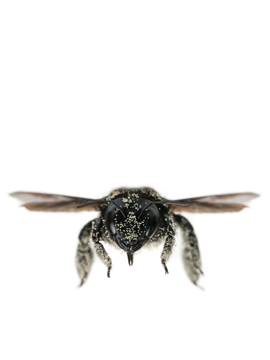
Carpenter Bee Control In Philadelphia
Commercial And Residential Bee And Flying Pest Control
Evans Pest Control Provides Effective Treatment For The Elimination Of Bees
Bees, hornets, and wasps are for the most part a very beneficial group of insects, being the major pollinators of flowering plants, helping to reduce the numbers of many insect pest species, etc. However, of the 54 reported deaths each year from arthropod bites or stings, bees, hornets, and wasps account for about 30 percent.
Bees, hornets, and wasps are categorized as being either solitary or social. Solitary species are those whose members live independently of each other. Social species are those who live together in colonies or nests and which have an adult division of labor or caste system composed of workers, queen(s) and, periodically, males.
The more common solitary groups include the carpenter bees, cicada killers, digger wasps, mud daubers, potter and mason wasps, spider wasps, and velvet ants. The more common social groups include the bumble bees, honey bees, hornets, paper wasps, and yellowjackets.
Years of experienced detail oriented services by our highly trained staff, the right equipment, dedication, and professional service makes Evans Pest Control one of the most reliable, and efficient bee and pest exterminators in Philadelphia.
Carpenter bees do not consume wood, but their tunneling can be destructive to softwoods and hardwoods alike. Under normal conditions they are not very destructive; however, if several generations of carpenter bees have been tunneling in the same area, extensive damage is possible.
Male bees often are seen hovering near nests and will approach nearby animals. However, males are harmless, since they do not have a stinger. Female carpenter bees are capable of stinging, but they are docile and rarely sting unless caught in the hand or otherwise directly provoked.
Bee Control
Since bees, hornets, and wasps are beneficial, control should only be done where there is an immediate threat to people or their pets, or when peace-of-mind is required. If control/elimination is required, then use a professional exterminator like Evans Pest Control. For social species, locate the nest entrance for each colony to be controlled during the day. Pesticide application should be done at night when most of the adults are on/in the nest and should be performed. Only background lighting should be used and a bee veil should be worn. Nests of solitary species, should be treated during daylight and personal protective equipment should be worn (i.e., beekeeper’s protective gear and clothing). See the individual treatments for more specific directions.
Get a Free Phone Consultation
Having a bug problem? Talk to a professional right now!
How Can We Help?
Drop us an email and we will help you today!

